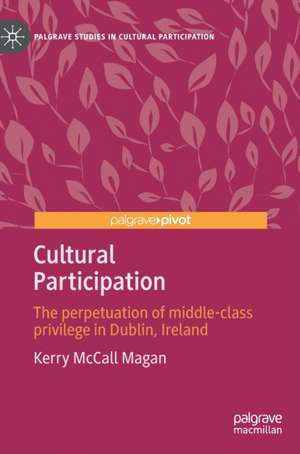Cultural Participation: The perpetuation of middle-class privilege in Dublin, Ireland: Palgrave Studies in Cultural Participation
Autor Kerry McCall Maganen Limba Engleză Hardback – 2 ian 2023
Preț: 319.29 lei
Nou
Puncte Express: 479
Preț estimativ în valută:
61.10€ • 63.41$ • 51.07£
61.10€ • 63.41$ • 51.07£
Carte disponibilă
Livrare economică 25 februarie-11 martie
Livrare express 08-14 februarie pentru 30.01 lei
Preluare comenzi: 021 569.72.76
Specificații
ISBN-13: 9783031187544
ISBN-10: 3031187547
Pagini: 140
Ilustrații: X, 140 p.
Dimensiuni: 148 x 210 x 16 mm
Greutate: 0.34 kg
Ediția:1st ed. 2022
Editura: Springer International Publishing
Colecția Palgrave Macmillan
Seria Palgrave Studies in Cultural Participation
Locul publicării:Cham, Switzerland
ISBN-10: 3031187547
Pagini: 140
Ilustrații: X, 140 p.
Dimensiuni: 148 x 210 x 16 mm
Greutate: 0.34 kg
Ediția:1st ed. 2022
Editura: Springer International Publishing
Colecția Palgrave Macmillan
Seria Palgrave Studies in Cultural Participation
Locul publicării:Cham, Switzerland
Cuprins
1. Introduction.- 2. Sociological Questions Of Culture.- 3. Ireland.- 4. Researching Culture, Class And Distinction In Dublin, Ireland.- 5. A Nation Highly Engaged.- 6. Emerging Cultural Capital.- 7- Policy Implications And Recommendations.
Notă biografică
Kerry McCall Magan is Country Director for the British Council in Ireland. In this role, Kerry is engaged in strategic cultural relations activity between the UK and Ireland that fosters understanding, knowledge and trust between both nations, in the areas of arts and culture, higher education and youth development. Prior to this, Kerry’s career has included senior roles in higher education, and the arts and cultural sectors in Ireland.
Textul de pe ultima copertă
This book provides a nuanced account of cultural competence, knowledge and skills illustrated in distinctive taste in the middle and upper classes in Dublin, Ireland (Bourdieu, 1984, 1986). It highlights how the development of cultural taste at a young age is linked to cultural participation in later life. Inspired by work that captures the textured social cartography of distinctive cultural taste (Bennett, Emmison & Frow, 1999; Bennett, Savage, Silva, Warde, Gayo-Cal & Wright, 2009), this research charts the changing nature of cultural participation in Dublin, Ireland and shows how cultural consumption has broadened from the narrow range of traditional high art forms towards one which grazes across the general register of culture. As elsewhere, this omnivorous, broad and pluralistic cultural palette has not altered patterns of distinction in cultural participation, rather it belies an emerging cultural capital profile - one where art form boundaries have collapsed but social boundaries and cultural distinction remains intact. Through interviews with two age cohorts (18-24yrs) and (45-54yrs) in Dublin in 2019, this research shows how the dominant class, through histories of cultural exposure have developed cultural taste and competence that is remarkably enduring. Reviewing available data on arts attendance and cultural participation in Ireland today, this text highlights how years of cultural familiarity allow individuals to exert a cultural dominance that facilitates class to be performed obliquely. It also demonstrates how existing surveys reinforce traditional ways of seeing with 'art' considered highbrow, formal and valued while culture is domestic, informal and less valued in the eyes of polity. This view informs Irish arts strategy and policy, ultimately reinforcing that 'ways of seeing' and policy perspectives, do matter (Berger, 1972).
Kerry McCall Magan is Country Director for the British Council in Ireland. In this role, Kerry is engaged in strategic cultural relations activity between the UK and Ireland that fosters understanding, knowledge and trust between both nations, in the areas of arts and culture, higher education and youth development. Prior to this, Kerry’s career has included senior roles in higher education, and the arts and cultural sectors in Ireland.
Caracteristici
Uses the perspective of a small, postcolonial nation to evidence the importance of cultural participation Demonstrates that understanding cultural participation helps inform arts and cultural policy Illustrates the need for future research to develop understandings specific to generations, class and geographies



